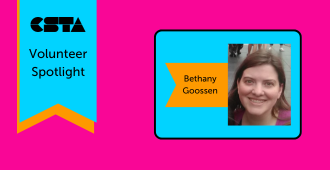Welcome to the CSTA Volunteer Spotlight series, where we celebrate the incredible individuals who dedicate their time and passion to making a difference in the CSTA community. Join us in recognizing and appreciating the extraordinary efforts of Bethany in their role as Awards Committee Member.
What inspired you to volunteer your time with CSTA? How has this experience impacted you?
I started volunteering in the CSTA because the organization had been incredibly helpful to me, and I wanted to extend that help to others. I also wanted to grow professionally and meet more people in computer science education. I feel like the experience has given me exactly those two things: great opportunities to use my talents for others and chances to build my own career and knowledge base.
How long have you been involved with CSTA, and what motivated you to join?:
I’ve been involved with the CSTA since 2015 when, as a STEM teacher in a school without an established curriculum, I discovered the CSTA standards for student education. Using them as a reference led me to find other resources the organization provided, and the more I saw, the more I wanted to be part of it.
Can you share any memorable experiences or highlights from your involvement with CSTA?
The Volunteer Summit of 2022 was amazing! I’ve been on teams where some people wanted to pitch in, and some people didn’t. I’ve been on committees where there was an attempt at communication, but too many cliques formed, and new ideas got brushed aside. Being with the CSTA volunteers, sharing and planning, felt like the way group work is supposed to happen.
How has CSTA impacted your teaching career and professional development?
My lesson plans have become so much more well-rounded and inclusive, and my outlook on how important and possible organized steps forward can be for tech education has brightened significantly.
In what ways do you see CSTA shaping the future of computer science education?
Thankfully, the need for digital literacy education is starting to become part of the national conversation. Schools and legislators need groups of professionals like the CSTA — people who occupy the space where technology and teaching meet — to offer guidance as we all rethink what preparation for the workforce should look like.
Are there any specific initiatives or projects within CSTA that you’ve been particularly passionate about?
Offering recognition for students and teachers who do cool things that they are excited about has always been a joy for me, and that is why I have spent most of my volunteer time specifically with awards.
What does the future of CSTA look like?
I believe the opportunities to engage schools on structural levels will only grow. Between the development of consumer-end AI products and the increasing need for digital skills for workers, academic institutions are going to need technologically proficient people in their corners, offering guidance for curriculum, faculty training, device acquisitions, and a million other things. An organized group of instructors who are ready to present community-minded answers for administration is going to be an increasingly invaluable resource.

